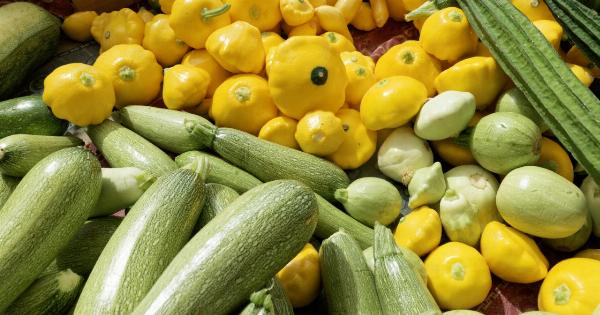Eating a healthy and balanced diet is crucial for maintaining good overall health, including the health of our eyes.
While most people are aware that carrots are good for the eyes, there are several other vegetables that can also contribute to preventing eye diseases. In this article, we will explore how vegetables can help prevent eye diseases and why they should be a part of your daily diet.
The Importance of Eye Health
Our eyes play a vital role in our daily lives, allowing us to see and experience the world around us. However, as we age, our eyes become more susceptible to various diseases that can significantly impact our vision.
Conditions like cataracts, age-related macular degeneration (AMD), and glaucoma can lead to vision loss if left untreated. Taking proactive steps to maintain eye health is essential to prevent these diseases and preserve our vision.
Nutrients in Vegetables for Eye Health
Eating a diet rich in vegetables provides us with essential nutrients that can help protect our eyes from various diseases. Here are some of the key nutrients found in vegetables that promote eye health:.
Lutein and Zeaxanthin
Lutein and zeaxanthin are antioxidants that are concentrated in the macula of the eye. These nutrients help filter harmful blue light and reduce oxidative stress in the eye.
Studies have shown that a diet high in lutein and zeaxanthin can reduce the risk of developing AMD and cataracts. Leafy green vegetables such as spinach, kale, and Swiss chard are excellent sources of these nutrients.
Vitamin A and Beta-Carotene
Vitamin A is essential for maintaining good vision, and beta-carotene is a precursor to vitamin A. Both these nutrients are known to promote eye health and prevent night blindness.
Carrots, sweet potatoes, and butternut squash are rich in beta-carotene, which the body converts into vitamin A.
Vitamin C
Vitamin C is a powerful antioxidant that helps protect the eyes from damage caused by free radicals. It also supports the health of blood vessels in the eyes. Citrus fruits, bell peppers, and broccoli are excellent sources of vitamin C.
Vitamin E
Vitamin E is another antioxidant that reduces the risk of cataracts and AMD. It works in conjunction with other antioxidants, such as vitamin C and lutein/zeaxanthin, to protect the eyes from oxidative damage.
Almonds, sunflower seeds, and spinach are rich in vitamin E.
Other Antioxidants
In addition to the nutrients mentioned above, vegetables also contain various other antioxidants that are beneficial for eye health. These include anthocyanins found in blueberries and blackberries, and resveratrol found in grapes and red wine.
Reducing the Risk of Age-Related Macular Degeneration (AMD)
Age-related macular degeneration is a leading cause of vision loss in individuals aged 50 and older. Fortunately, several vegetables can help reduce the risk of developing this condition:.
Leafy Green Vegetables
Leafy green vegetables such as spinach, kale, collard greens, and Swiss chard are rich in lutein and zeaxanthin. These antioxidants help protect the macula from oxidative damage and reduce the risk of AMD.
Including these vegetables in your daily diet can significantly benefit your eye health.
Colorful Bell Peppers
Bell peppers, especially the brightly colored ones, are high in vitamin C and other antioxidants. Consuming bell peppers regularly can help lower the risk of AMD and maintain overall eye health.
Preventing Cataracts
Cataracts are cloudy areas in the lens of the eye, which can cause blurry vision and eventually lead to vision loss. Fortunately, certain vegetables can play a role in preventing cataracts:.
Carrots
Carrots are often associated with good eye health, and for a good reason. They are rich in beta-carotene, which the body converts into vitamin A. Vitamin A is essential for maintaining healthy eyes and preventing night blindness.
Incorporating carrots into your diet can contribute to preventing the formation of cataracts.
Cruciferous Vegetables
Cruciferous vegetables such as broccoli, cauliflower, and Brussels sprouts are packed with antioxidants and other essential nutrients.
Studies have shown that consuming cruciferous vegetables can help reduce the risk of cataracts and maintain clear vision.
Protecting Against Glaucoma
Glaucoma is a group of eye conditions characterized by damage to the optic nerve, often associated with high intraocular pressure.
While diet alone cannot prevent or cure glaucoma, certain vegetables may help support overall eye health and potentially reduce the risk of glaucoma progression:.
Green Leafy Vegetables
Green leafy vegetables such as spinach, kale, and collard greens are rich in nutrients like vitamin C, vitamin E, and other antioxidants.
While more research is needed, some studies suggest that these vegetables may help lower the risk of glaucoma and slow down its progression.
Tomatoes
Tomatoes are an excellent source of lycopene, a powerful antioxidant that gives them their vibrant red color. Some research suggests that lycopene may help reduce the risk of glaucoma.
Including tomatoes or tomato-based products in your diet can be a healthy addition to maintaining eye health.
Conclusion
Incorporating a wide variety of vegetables into your diet can significantly contribute to preventing various eye diseases and maintaining good eye health.
The nutrients found in vegetables, such as lutein and zeaxanthin, vitamin A, vitamin C, and vitamin E, along with other antioxidants, play a crucial role in protecting the eyes from oxidative stress and age-related damage. By making vegetables a staple in your daily meals, you can take an active step towards preserving your vision and preventing eye diseases.






























